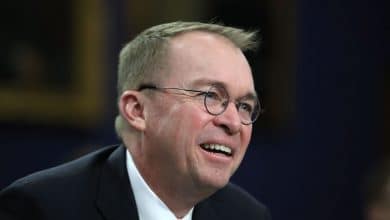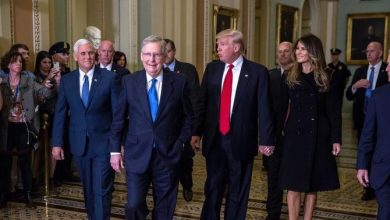
[dropcap]D[/dropcap]onald Trump ran for president as a different kind of Republican. During the primary, he stood out from the crowd by promising to protect Social Security, Medicare, and Medicaid. He went on to make that promise a centerpiece of his general election campaign.
Even before the election, there was good reason to be extremely skeptical of Trump’s promise. After all, prior to running, he had called Social Security a Ponzi scheme, said that “privatization would be good for all of us,” and, in true elitist fashion, called for raising the retirement age to age 70, because “how many times will you really want to take that trailer to the Grand Canyon?” Moreover, he selected Mike Pence as his vice president. Pence has a long record of attacking Social Security, Medicare, and Medicaid. Indeed, Pence criticized Bush’s Social Security privatization proposal for not going far enough, fast enough!
It is clear that Trump understands how popular these programs are. Social Security has famously been called the third rail of politics – go after it and your political career is dead. In a 2011 interview with Sean Hannity, Trump said he was on board with plans to cut Social Security, Medicare, and Medicaid — but that Republicans should be very careful “not to fall into the Democratic trap” by doing it in the open, without bipartisan cover, or they would pay the price politically.
So, did Trump mean what he said during the campaign? Or, did he say what he needed to in order to get elected, knowing all along he would break his campaign promise? Unfortunately, It looks like the latter. After only 100 days in office, he has already jeopardized his promise to the American people in at least five ways:
1. Championing a “health care” bill that would raid Medicare and gut Medicaid
The American Health Care Act, AKA Trumpcare, would be very destructive to both Medicare and Medicaid. Trumpcare raids $117 billion dollars from Medicare, depriving the program of essential funding and giving Congressional Republicans the perfect excuse to call for cuts a few years down the road. It cuts nearly a trillion dollars from Medicaid, which would be a disaster for, among others, millions of seniors, who rely on Medicaid to pay for long term care costs, both at home and in nursing homes.
Trumpcare would also be a disaster for Social Security beneficiaries in their early 60s who aren’t yet eligible for Medicare. The bill would allow insurance companies to charge older customers far more, which the CBO estimates could lead to a massive 750% increase in their premiums. Not only has he not opposed these campaign-breaking promises, he is “disappointed,” he says, that House Republicans haven’t yet rammed this harmful legislation through.
2. Appointing Anti-Social Security Mick Mulvaney as Budget Director
If Trump truly intended to keep his promise to protect Social Security and Medicare, he would be surrounding himself with people who support that goal. He has done exactly the opposite. For the key position of Director of the Office of Management and Budget, Trump appointed Mick Mulvaney, a member of the House Freedom Caucus well known for his fervent support of Social Security and Medicare cuts.
Mulvaney has enormous influence over the budgets of the agencies responsible for administering Social Security, Medicare, and Medicaid. If that weren’t bad enough, he promised both GOP lawmakers and right-wing media personalities that he will push Trump to cut Social Security. On recent television appearances, including Face the Nation, Mulvaney has outrageously asserted that Social Security Disability Insurance isn’t “real” Social Security.
Obviously, Social Security’s insurance against the loss of wages in the event of disability, as well as old age and death, are all essential parts of working families’ earned Social Security benefits. But, it is not hard to see the method in Mulvaney’s madness. By Mulvaney’s Orwellian illogic, Trump could cut Social Security, but claim he did not!
3. Appointing Anti-Medicare Tom Price as Health and Human Services Secretary
4. Instituting a Months-Long Hiring Freeze That Hurt Social Security Beneficiaries
Social Security doesn’t add a penny to the deficit. Indeed, it has dedicated revenue and an accumulated surplus of $2.8 trillion, out of which is paid not only benefits but the associated administrative costs. Nevertheless, only days after taking office, President Trump instituted a federal hiring freeze that included the Social Security Administration, which is already in a weakened state due to years of budget cuts imposed by Congressional Republicans. The hiring freeze forced SSA to turn away beneficiaries who came to their field offices for assistance.
Trump claims he wants to run government like a business. Any business that had a product as successful and profitable as Social Security would be increasing customer service, not restricting it. Making it harder for Americans to access their earned Social Security benefits – access they have already paid for – is terrible policy and a violation of Trump’s promise.
5. Staying Silent in the Face of Attacks on Social Security and Medicare From His Own Administration and Party Leadership
During the election, Trump had no problem attacking leaders in his own party for supporting Social Security, Medicare, and Medicaid cuts. He went so far as to say “they want to really cut [Social Security], and they want to cut it very substantially, the Republicans, and I’m not going to do that” and even called out Paul Ryan by name. He, also, has not lost his flair for tweeting.
But since the election, Trump has been completely silent in the face of attacks on Social Security and Medicare from GOP leaders. Not one comment. Not one tweet.
Just days after the election, Ryan made it clear that he plans to make 2017 the year that he finally accomplishes his decades long goal of destroying Medicare via privatization. Trump said nothing. In December, the Republican Chair of the House Social Security Subcommittee introduced a bill to gut Social Security. Trump said nothing. This silence even extends to his own administration. Mulvaney is all over television attacking Social Security and saying that Trump’s promise isn’t binding, and the president has declined to reprimand him.
A few weeks ago, reports emerged that the White House was considering, as part of its tax plan, the idea of weakening Social Security, perhaps fatally, by raiding a substantial part of its dedicated revenue. Though that proposal has not yet emerged, the tax proposals that have been released have encouraged right-wing ideologues to argue, in the Wall Street Journal’s opinion page and elsewhere, that the proposed tax cuts for corporations and billionaires are great but would be even better if they were paid for by cuts to Social Security, Medicare, and Medicaid. Still, Trump has said nothing.
As Trump acknowledged during the primaries, Republican politicians are hostile to Social Security, Medicare and Medicaid. Even though Trump’s first 100 days have shown no fidelity to his campaign promise, it is not too late for him to prove he really is different from the Republican establishment.
He can repudiate that part of Trumpcare that undermines his promise. He can make clear that Mulvaney and Price are not running the Social Security, Medicare and Medicaid show. He can propose and push for the adequate funding of SSA and the part of HHS responsible for the administration of Medicare and Medicaid. And most important, he can attack those in his party who propose dismantling these essential programs and tweet his continued commitment to them.
If he was not just conning the public when he promised to protect Social Security, Medicare, and Medicaid, he should do all of those things. The first 100 days should not make any of us hold our breath in anticipation, though.







